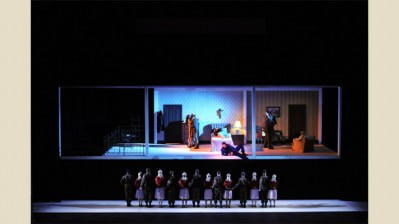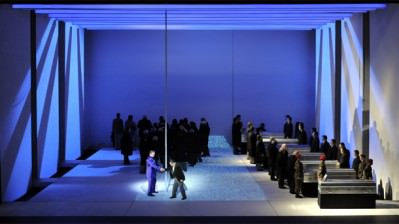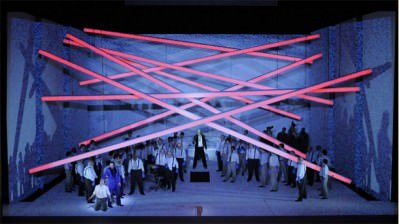The Damnation of Faust

At Lyric Opera of Chicago
20 N Wacker, Chicago
As we draw closer to summer, we also, sadly, near the end of the opera season. Oddly, the new production at the Lyric Opera, its penultimate, was never considered an opera by its composer. Instead, Hector Berlioz, the maverick French composer and master orchestrator, considered La Damnation de Faust a dramatic legend. Though there may be a heated debate over the difference, something is palpably different. Despite animating the music with environmental video, a mutable stage, diegetic dancing, and lucid staging, the experience of the work is still not quite like seeing an opera—not better or worse, just different.

Berlioz based his libretto on Goethe’s classic Faust legend, in which the eponymous scientist pursues love at the expense of his soul. Berlioz unfolds the drama at the onset of Spring, resonating with what Chicagoans must be feeling in coming weeks. The unspoken tragedy of Spring, however, is that it witnesses the highest rate of suicide of the year. Thus, Faust’s anomie is contrasted by the jubilation of the rest of society— his isolation versus the communal joy. Tempted by suicide, he falls into league with a mysterious stranger, Mephistopheles, who offers Faust an alternative to his misery: Marguerite. They become infatuated with one another, but their love is doomed, ending with his damnation and her salvation.

The plot, essentially, remains the same in each retelling of the legend. Berlioz’s version, however, applies a lighter, French veneer to the originally German story. Musically, this work resides closer to serenity than anguish. Dramatically, it merely dabbles in Faust’s angst before quickly returning to more joyous tones. The devil character is more comical than sinister; Marguerite maintains her naiveté and innocence at the expense of character depth. The plot flows lazily forward, at times diverting its forward momentum with entertaining tangents. The French are not known for rigorous structure, and this work is no different.
Unlike traditional operas, this work only has four roles: Faust, Mephistopheles, Marguerite, and some guy named Brander. Susan Graham as Marguerite is the clear star, both in reputation and performance, despite the relative lack of stage time. She first sings in the third part, which she helps usher in with the song “Merci doux crepuscule.” The tender, intimate melody is the perfect vehicle for Ms. Graham’s expressivity, which she uses to bring the listener on an emotional journey from warmly personal to boldly heroic and back. She does this with an incredible range of tone, from earthy and sultry to bright and confident. Hers is clearly one of the best voices this season at Lyric, eliciting enthusiastic ovations both during and after the performance. John Relyea as Mephistopheles also received well-earned approval for his stentorian voice and otherworldly charisma. Christian Van Horn as Brander had a smooth, unctuous voice that perfectly suited his character. Unfortunately, Paul Groves, Faust, was outshone by the aforementioned talents. His tone lacked the variety of Ms. Graham’s and so grew stale. To be fair, Berlioz created a challenging part with few places to shine and many places to stagnate. Groves was competent in the face of this challenge, meeting but not exceeding expectations.
Supporting the leads, the gifted Lyric chorus played roles such as townspeople rejoicing in Spring, demons seducing the lovers, and angels welcoming Marguerite to her new home. Despite some problems synchronizing with Sir Andrew Davis and the orchestra, the chorus showed incredible dramatic and musical flexibility, sliding from one role to the next. Also on stage were about a dozen dancers. More than just a decoration, the choreograph contributed to the telling of the story.

Visually, the stage and set were stunning, fusing video, lights, and a moveable stage to frame, support, and enhance the drama. The elements fit together in a way that was both natural and abstract. Though risky, it provided a visual counterpoint to the score: adding much, taking away little. Be sure to check out the video on the Lyric’s website to get a preview.
Overall, this production stakes its claim as opera by weaving all these different art forms together. There is something for everyone: bombastic choruses, delicate introspection, exotic marches, and spectacular visuals. Somehow, though, in spite of all that is going on, it is missing something; somehow, in the shuffle, the characters get lost. Perhaps this is because it tries to be both an opera and an oratorio, so the singers are stuck between showing the action and telling a story. There is a lot of pretty music, but beneath there is only the semblance of anything deeper: the lights are on but nobody is home. Come for Susan Graham and the choruses. Stay for the stage, and the Devil. Bask in the sensual beauty but don’t try to think too hard.
Recommended
Evan Kuchar

“The French are not known for rigorous structure, and this work is no different.”
This review is fraught with all sorts of shallow pretention, and skews enough thereby to be ultimately self-contradictory, but the meaninglessness of the above line is enough reason to dismiss with it entirely.
Self. Indulgent. Writing.
Yes, that phrase is a gross generalization, a stereotype, and is ultimately too vague, leaving out a standard with which to judge. It is based on the historical contrast I find between Rameau and Bach as representatives of their respective countries. Rameau “invented” root-motion harmony, while Bach was a master of counterpoint. The former speaks to the sensuousness of music, which can be heard in Berlioz, Debussy, Grisey et ainsi de suite; the latter speaks to the rigorous logic of music, heard in Beethoven, Wagner, Schoenberg, und so weiter.
Obviously, I can’t say all this in a review, so it gets summarized, sometimes leaving out the necessary and supporting details.